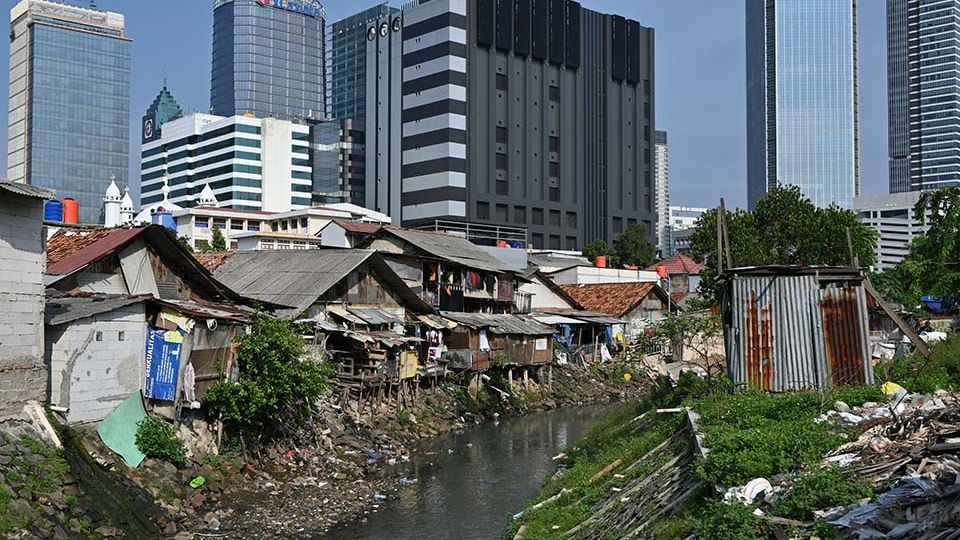May 22, 2025
JAKARTA – Jakarta Governor Pramono Anung has pledged to upgrade all of the city’s slum areas by 2027 without relocating any residents, but many remain skeptical, recalling past administrations that evicted people in the name of urban development.
This year, the Jakarta Housing and Settlement Agency plans to revitalize 55 slum areas across the city: 10 in Central Jakarta, three in North Jakarta, 17 in West Jakarta, 12 in South Jakarta and 13 in East Jakarta.
These neighborhoods are typically overcrowded, with poorly built housing and limited access to sanitation. One such area is Menteng Tenggulun in Central Jakarta, situated along the polluted banks of the Ciliwung River and home to over 1,980 registered families.
Governor Pramono visited the neighborhood last week, where he announced the revitalization plan. The Indonesian Democratic Party of Struggle (PDI-P) politician claimed he would not evict any residents from Menteng Tenggulun, but rather improve key infrastructure there, such as roads, drainage systems and sanitation.
“We are not evicting anyone. [We will make sure] that economic activities will continue during the revitalization process,” said Pramono, the former cabinet secretary.
Read also: Pramono targets over 1,000 ‘rusunawa’ units by next year to ease housing backlog
Retno Sulistyaningrum, the housing agency’s settlement division head, confirmed to The Jakarta Post separately that the program targets basic facility upgrades, adding that better communal infrastructure is expected to raise the overall quality of life.
Despite these assurances, many residents remain skeptical—especially those who do not formally own land. Deputy Governor Rano Karno has previously floated the idea of relocating slum dwellers to low-cost rental apartments, known as rusunawa, reigniting old fears.
For 63-year-old Mulyati, the current plans are all too familiar. A resident of Menteng Tenggulun since 1976, she has heard similar promises for decades with little change.
“I’ve been hearing about similar plans since I was a teenager. Nothing ever really happened. We’re still living in a slum,” Mulyati, who originates from Purwokerto in Central Java, told the Post on Monday.
She is now concerned about her land status. Without a land ownership certificate (SHM), and only holding a right-to-build permit (HGB), Mulyati fears she could be forced to move.
“It’s within their [the city administration’s] authority to relocate us to rusunawa since most of us only hold HGB,” she said.
Read also: Jakarta to bury overhead power cables for safety
Her neighbor, 40-year-old Syamsul Arifin,shares the same anxiety. Living in a 29-square-meter home with his family of eight, he said relocation to a rusunawa would create financial strain.
“I hope the plan won’t force me to leave my home,” said Syamsul. “I’m worried that living in a rusunawa, which could be far from my workplace, would put a financial strain on me.”
Despite the cramped conditions of his house, the street vendor said it’s still preferable to moving, especially since he does not pay rent and lacks a stable monthly income. Syamsul’s food stall is located in Setiabudi, South Jakarta, which is about three kilometers away from his current residence.
On the other hand, the city is set to build two new rusunawa and revitalize an existing one, all situated in North Jakarta.
Issues surrounding land tenure have long complicated Jakarta’s urban planning. Previous projects, such as the Ciliwung River normalization, were met with resistance because of forced evictions—actions that drew criticism from activists and environmental groups.
Urban planning expert Elisa Tanudjaja from the Rujak Center for Urban Studies stressed that revitalization alone would not be sufficient unless land status disputes are resolved.
“If the land is still owned by the state, the solution could lie in granting residents formal ownership rights,” Elisa said on Monday


